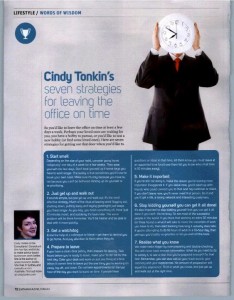This article about effective time management strategies was originally published in Law Practice Management Journal. It also appeared, in a slightly different form, in Mortgage Professional Magazine.

So, you’d like to leave the office on time – at least two or three times a week. Perhaps your loved ones are waiting for you, you have another life to live, or you’re interested in finding that other life. Here are eight time management strategies to help you manage time better, and get out of that door when you’d like to.
1. Time management strategies: Start with small chunks – Plan for once a week first
Here is the first step. Depending on the size of your habit, consider going home ‘religiously’ one day of a week, for a few weeks. Then, ease yourself into two days. Don’t beat yourself up if you have to work longer on some days. The reality is that some times you’ll have to break your own rules. Make sure it’s only because you have to, not because you can’t be bothered with sticking up for yourself, or re-prioritising.

2. Just get up and walk out
It sounds simple, but just get up and walk out at the right time. It’s one of the most effective time management strategies. Many of the rituals of leaving work (logging out, shutting down, putting away and saying goodnight) just keep you there longer. As you tidy up, you pick up a matter, thinking ‘just 10 minutes more’, and suddenly it’s 8 pm. The same problem will still be there tomorrow morning. But you’ll be fresher, and will be able to deal with it more quickly.
3. Get a watchdog
Enlist the help of a colleague or friend – get them to remind you to go home. And pay attention to them when they do. It’s one of the more under-rated time management strategies, but it works and it lets you hit the office door when you originally planned to.

4. Prepare for it
If you have a clean-desk policy, then prepare for leaving. Two hours before you’re ready to leave, make your ‘to-do’ list for the next day. Clear your desk, and work on just one thing at a time. When it is time to leave, put away the one thing that you’re working on, log off, and leave.
Do not take appointments for the last hour of the day, you want to manage time properly. If people have questions or ideas in that time, let them know you must leave at an appointed time (and have them let you know when that time is 10 minutes away).
5. Punish or reward yourself
It’s all very well to have people remind (or bully) you to leave. Too many people say ‘yes, yes, I’m off’, but then they’re still around three hours later. Take it one step further. Offer yourself a reward for leaving, or a punishment for not, if that suits you better. Drink instant coffee instead of filtered coffee if you transgress. Book a massage to celebrate adherence.

6. Make it important enough
If you’re still not doing it, make the reason you’re leaving more important. ‘Catastrophise’ the issue – if you don’t leave now, you’ll not meet that big client who will help your career. If you do leave now, you’ll get a chance to make a few phone calls to friends who may be that next big client.
This way, you’ll have a life, a loving network and interesting ideas flowing through your mind.
7. Stop kidding yourself you can get it done!
It’s also important to stop kidding yourself that you can get it all done, if you can’t. You’re busy. So are most of the successful people in the world. If you think that working an extra 30 minutes (or three hours) is what it will take to move the mountain of work you have to do, then start tracking how long it actually does take.
If you’re attempting to do 18 hours of work in a 10-hour day, then perhaps you’d better re-prioritise, or let yourself off the hook. Accept that it’s 18 hours. Stay at work to complete it, or split it into two days. None of us is superhuman. If it’s 18 hours, don’t kid yourself that you can do it in 10 hours.

8. Realise what you know
Of course, we make tasks bigger by over-preparing, double-checking and examining every alleyway of opposition. You will never have enough information. Listen to your inner voice. What do you need to do to satisfy it, to see or feel that you’re prepared enough? Do that first.
Your entire lifetime has brought you to where you are now. You can call on your track record, your memory and your experiences. No amount of preparation will equal this. Realise what you know, and just get up and walk out at the right time!
Cindy Tonkin can help you improve your business. Coaching by phone, email or in person.
Corporate training for your consulting team.
